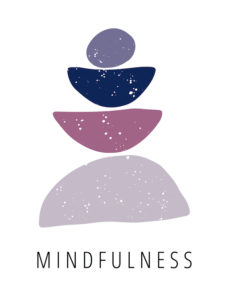Doctors’ Notes
BackMindfulness
 Each year, I eagerly await the annual conference of the National Association of Pediatric Nurse Practitioners. This conference gives me the opportunity to network with colleagues and, most importantly, increase my clinical knowledge and skills needed to give high quality care.
Each year, I eagerly await the annual conference of the National Association of Pediatric Nurse Practitioners. This conference gives me the opportunity to network with colleagues and, most importantly, increase my clinical knowledge and skills needed to give high quality care.
This past year at Kids Plus, I’ve seen so many children and families struggle with anxiety, even children as young as 4 and 5 years of age. Therefore my focus for the educational sessions at this year’s conference was mental health. One of the most interesting lectures was on mindfulness.
Mindfulness-based stress reduction was first introduced in 1970 by Jon Kabat-Zinn and was used in medicine and health care. A simple definition of mindfulness is “to be present in the moment.” Mindfulness involves being aware of our thoughts and feelings, and of how the body responds to these thoughts and feelings.
Children as young as 4 years of age can be taught this type of stress reduction to help them manage stress, anxiety, anger and frustration, as well as to improve impulse control, focus and concentration.
Strategies for mindfulness for children include breathing, relaxation and guided imagery. For adolescents, these same strategies apply, as well as plus meditation, mindfulness cognitive behavioral therapy, and the idea of managing thoughts and feelings through active participation.
Several books are available to help children learn mindfulness. Here is an excerpt from one of these books, called Peaceful Piggy Meditation:
“It can be hard not to lose your temper when you get angry and you can get really frustrated whenthings do not go your way. So it is really good to have a peaceful place inside. It’s good to meditate. Peaceful piggies know when to take a break and find a place to breathe, breathe, breathe.”
Other resources include: Mindful Monkey Happy Panda, Moody Cow Meditates, Sitting Still Like a Frog, Angry Octopus and Sea Otter Cove. Go Zen is a program that uses animation to teach children to understand and control their worry in a fun way.
Adolescents love technology, so there are apps such as Smiling Mind, Take a Chill, and Headspace that can be very helpful. Lori Lite books and a CD series entitled Indigo Dreams are other good resources for adolescents.
Giving children and adolescents positive ways to manage their feelings of anxiety, stress, anger, and frustration will give them tools to assist them as they go throughout life.
Terri Bailey is a Certified Registered Nurse Practitioner.